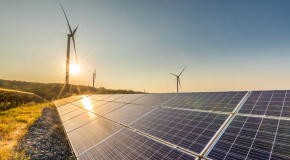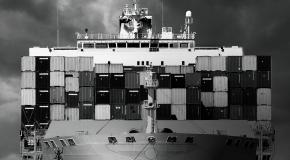Tech imperative: Looking beyond ESG investing to reinvent the future
Tech imperative: Looking beyond ESG to reinvent the future is a report from The Economist Intelligence Unit, commissioned by E Fund.
Related content

Green intelligence: Asia’s ESG investing, data integrity and technology
Environmental, social and governance (ESG) investing has evolved from the rather straightforward approach of stock exclusion to more sophisticated and data-heavy frameworks. How investment firms are tackling this ESG data load is a key question. This research analyses the degree to which artificial intelligence (AI) is being deployed, how it is being used and what more it might do in the future for ESG investment decisions. Integral to that question is an investigation into the state, availability and integrity of ESG data in Asia. Big data has offered insight in many other business sectors and industries, but is Asia’s ESG data big enough yet to be meaningful?
The Economist Intelligence Unit surveyed decision-makers at a spectrum of large asset owners and institutional investors about their observations related to “impact” versus “income” goals and about sentiment on data quality. We also spoke to a range of experts on the same topics to study how AI technology may be changing the investment world, specifically with regard to improving ESG returns or impact.
The key findings are as follow:
The rise of ESG in Asia: some 95% of respondents believe that ESG investing is important to their firm, with the overwhelming majority saying it will be more so in three years. More than 80% believe ESG has a positive impact on returns.ESG factor weighting: almost half of respondents said they weighted environmental, social and governance factors equally. For the remainder that didn’t, the individual most important factor was environmental, with mainland China’s increasing focus on such issues a major driver. About 90% of respondents feel that environmental and social issues will gain the same importance as governance within a decade.
Investors’ AI uptake: pension funds have the highest uptake of AI for ESG screening. There is, however, broad usage across all investor types and regions. A rapidly expanding range of AI techniques, drawing information from diverse sources, is being used to fill gaps in standard corporate disclosures.
Data quality and suitability: while there is broad satisfaction with available data, this is combined with recognition that gaps exist. Most investors are responding to such limitations by conducting their own research on the information available.
Looking forward: much ESG-related data are backwards-facing and cannot, therefore, identify ongoing change in corporate behaviour. The promise of adding AI to the equation is to get a more forward view. Analytics companies are developing models to flag behavioural shifts and experts stress that focusing on data only misses the importance of how it is framed—something that remains a very human decision.

Sustainable and actionable: An ESG study of climate and social challenge fo...
Along with its wealth, Asia’s climate risks have been rising. Low-lying coastal cities are particularly vulnerable to climate change and regional population and economic centres—such as Bangkok, Ho Chi Minh City, Manila and Shanghai—sit upon that precipice. Yet in terms of green fixed income, Asia faces another risk: lack of issuance and uptake.
Fixed-income plays a significant role in climate mitigation because its market is about 60% larger than its equity cousin which still attracts more media and investor attention. Global issuance of green fixed income has increased markedly since its inception, reaching US$350bn in 2019. Still, the amount is only about 5% of the global fixed income market and represents just over a tenth of what needs to be raised to meet Sustainable Development Goals (SDGs) in emerging markets alone.
Efforts to make Asia’s finance greener have marked a transformative effect on the relationship between companies and investors. Conversations about sustainability that were absent a decade ago are now happening and have been central to helping the region come so far in such a short time: Asia’s banks and corporates have gone from 1% of green issuance in 2013 to 45% in 2019.
Still, not all is rosy (or green) as many obstacles remain. Asia’s green fixed income originates from a narrow base. China is the dominant market regionally and credit quality is largely confined to supranational institutions and investment-grade issuers. That is not enough. Other markets, such as high-yield, assetbacked securities (ABS) and private debt are, at best, in infancy. Furthermore, developedmarket investors tend to underweight Asia.
Green fixed income data is also a persistent challenge. A profusion of providers use a wide range of methodologies, many of which can be opaque and defy comparison. Investors face difficulties in determining those which best suit their needs. The vast amount of data that issuers are required to provide can also be a deterrent to going green; or worse, it leads to “greenwashing”, a vexing problem of questionable categorisation globally. The emergence of more consistent taxonomies is helping, but the patchwork of approaches still forms a barrier. Market practitioners interviewed for this paper did find agreement on green fixed income limitations, but they also showed optimism that recent developments in debt-products indicate a positive direction, even if the needle measuring progress has yet to move as far as it should.
From consensus, the region’s green fixed income progress depends on the development of a consistent taxonomy—not just in Asia, but globally—as well as better linkage of Paris Agreement goals to quantifiable key performance indicators (KPIs). The result could create better incentives for issuers and asset owners alike.
Have green bonds—as the largest green fixed income competent—been enough? Despite the interviewees’ breadth of experience and varied professional functions, they are almost entirely synchronised in their response to this question: “no”.
So what’s next?

Financing sustainability: Asia Pacific embraces the ESG challenge
Financing sustainability: Asia Pacific embraces the ESG challenge is an Economist Intelligence Unit report, sponsored by Westpac. It explores the drivers of sustainable finance growth in Asia Pacific as well as the factors constraining it. The analysis is based on two parallel surveys—one of investors and one of issuers—conducted in September and October 2019.
If the countries of Asia Pacific are to limit the negative environmental effects of continued economic growth, and companies in the region are to mitigate their potential climate risks and make a positive business contribution through improving the environment and meeting the UN's Sustainable Development Goals (SDGs), large volumes of investment in sustainable projects and businesses need to be mobilised. A viable sustainable finance market is taking shape in the region to channel commercial investor funds, and both investors and issuers say they are achieving a financial benefit from their investment and financing activities. The market is still in the early stages of development, however, and must expand and mature to meet investor needs.
The chief constraint on sustainable finance growth in the region has been the limited supply of bankable sustainable projects. Our research suggests supply is increasing, but with investor demand continuing to grow apace, the gap will remain an obstacle in the short- to medium-term. Among the organisations in our issuer survey, only 7% have used sustainable finance instruments to fund projects. However, nearly nine in ten (87%) said they intend to do so in the next year, which should begin to bridge the gap between supply and demand.
Based on issuers’ stated intentions, investors will have a range of instruments to choose from, including green loans and bonds and sustainability loans and bonds. Large numbers of investors indicate that they intend to deploy a greater proportion of capital to these over the next three years.
The Hinrich Foundation Sustainable Trade Index 2020 - Workbook
International trade has helped to lift hundreds of millions of people around the world out of poverty, but the benefits do not come without risk. Right or wrong, labour disruption, environmental degradation, and worsening inequality are frequently associated with trade. However, proactive and responsible policy can harness the good elements of trade while mitigating the bad, making for a more robust global trading community.
Related content

The Hinrich Foundation Sustainable Trade Index 2018
Yet the enthusiasm in Asia for trade does not appear to have waned. This broad societal consensus behind international trade has enabled Asian countries to continue broadening and deepening existing trading relationships, for example, by quickly hammering out a deal for the Comprehensive and Progressive Agreement for Trans-Pacific Partnership (CPTPP) in early 2018 following the US’s withdrawal from its predecessor in 2017.
Asia, then, finds itself in the unique position of helping lead and sustain the global economy’s commitment to free and fair trade. It is in this context that the need for sustainability in trade is ever more crucial.
The Hinrich Foundation Sustainable Trade Index was created for the purpose of stimulating meaningful discussion of the full range of considerations that policymakers, business executives, and civil society leaders must take into account when managing and advancing international trade.
The index was commissioned by the Hinrich Foundation, a non-profit organisation focused on promoting sustainable trade. This, the second edition of the study, seeks to measure the capacity of 20 economies—19 in Asia along with the US—to participate in the international trading system in a manner that supports the long-term domestic and global goals of economic growth, environmental protection, and strengthened social capital. The index’s key findings include:
Countries in Asia, especially the richer ones, have broadly regressed in terms of trade sustainability. Hong Kong is developed Asia’s bright spot, recording a slight increase in its score and topping the 2018 index. Several middle-income countries perform admirably, led by Sri Lanka. For the economic pillar, countries generally performed well in terms of growing their labour forces as well as their per-head GDPs. For the social pillar, sharp drops for some countries in certain social pillar indicators contribute to an overall decline. For the environmental pillar, with deteriorating environmental sustainability in many rich countries, China, Laos and Pakistan are the only countries to record increases in scores. Sustainability is an ever more important determinant of FDI and vendor selection in choosing supply-chain partners. Companies are improving the sustainability of their supply chains by restructuring and broadening relationships with competitors and vendors.
Hinrich Foundation Sustainable Trade Index-Infographic
The Hinrich Foundation Sustainable Trade Index 2020
Sustainability was gaining more traction in the years leading up to the Covid-19 pandemic. Firms stepped up commitments to corporate social responsibility (CSR) initiatives. Investors started incorporating environmental, social and governance (ESG) issues into their asset allocation decisions. And consumers voted with their wallets to support sustainable production, purchasing goods with certified claims regarding their environmental impact and use of labour.
Related content

Hinrich Foundation Sustainable Trade Index
International trade has become fundamental to economic growth and in doing so, has helped to lift hundreds of millions out of poverty. But it is not without costs and risks. The flow of goods and services across borders can disrupt labour markets, accelerate environmental degradation, and contribute to worsening inequality. With the right policies, these costs can be reduced, if not eliminated, and trade can become more sustainable.
The Hinrich Foundation Sustainable Trade Index was created for the purpose of stimulating meaningful discussion of the full range of considerations that policy makers, business executives, and civil society leaders must take into account when managing and advancing international trade. As a starting point, we define “trade sustainability”, or “sustainable trade,” as:
“Participating in the international trading system in a manner thatsupportsthe long-term domestic and global goals of economic growth, environmental protection, and strengthening social capital.
Read report in: English | 中文 | Tiếng ViệtView infographic in: English | 中文 | Tiếng Việt

The Hinrich Foundation Sustainable Trade Index 2018
Yet the enthusiasm in Asia for trade does not appear to have waned. This broad societal consensus behind international trade has enabled Asian countries to continue broadening and deepening existing trading relationships, for example, by quickly hammering out a deal for the Comprehensive and Progressive Agreement for Trans-Pacific Partnership (CPTPP) in early 2018 following the US’s withdrawal from its predecessor in 2017.
Asia, then, finds itself in the unique position of helping lead and sustain the global economy’s commitment to free and fair trade. It is in this context that the need for sustainability in trade is ever more crucial.
The Hinrich Foundation Sustainable Trade Index was created for the purpose of stimulating meaningful discussion of the full range of considerations that policymakers, business executives, and civil society leaders must take into account when managing and advancing international trade.
The index was commissioned by the Hinrich Foundation, a non-profit organisation focused on promoting sustainable trade. This, the second edition of the study, seeks to measure the capacity of 20 economies—19 in Asia along with the US—to participate in the international trading system in a manner that supports the long-term domestic and global goals of economic growth, environmental protection, and strengthened social capital. The index’s key findings include:
Countries in Asia, especially the richer ones, have broadly regressed in terms of trade sustainability. Hong Kong is developed Asia’s bright spot, recording a slight increase in its score and topping the 2018 index. Several middle-income countries perform admirably, led by Sri Lanka. For the economic pillar, countries generally performed well in terms of growing their labour forces as well as their per-head GDPs. For the social pillar, sharp drops for some countries in certain social pillar indicators contribute to an overall decline. For the environmental pillar, with deteriorating environmental sustainability in many rich countries, China, Laos and Pakistan are the only countries to record increases in scores. Sustainability is an ever more important determinant of FDI and vendor selection in choosing supply-chain partners. Companies are improving the sustainability of their supply chains by restructuring and broadening relationships with competitors and vendors.
Hinrich Foundation Sustainable Trade Index-Infographic
Seizing the moment: why now is the right time to ramp up action on climate change
Related content

Why post-Brexit trade talks are crucial for the UK's net-zero goal
In June 2019, the UK legislated to achieve net-zero emissions of greenhouse gases by 2050 following unprecedented calls to do so by the scientific, business and civil society communities. Getting there will require a significant increase in domestic policy ambition to ensure that the UK’s regulatory standards, fiscal incentives, market mechanisms and public spending are all aligned with the net-zero goal.
However, the way the UK develops its trade agreements after Brexit will have a critical bearing on its ability to achieve domestic targets and the extent to which UK businesses can gain a competitive advantage by providing the low-carbon goods and services that the world economy will increasingly demand.
Three priorities for the UK’s trade policy
When it comes to climate change and energy, the UK’s upcoming trade agreements need to deliver in three key areas. First, they must facilitate greater trade in low-carbon goods and services. It is estimated that the global market for low-carbon goods will be worth more than £1trn a year by 2030—7 to 12 times greater than today—with significant growth expected in the low-carbon services market as well. This presents a huge opportunity for the UK. British businesses have many existing competitive advantages in these areas, such as offshore wind farms, low-carbon building design, low-carbon industrial innovation and green financial, legal and insurance services.
Second, the UK’s future trade agreements should promote the UK’s reputation as a leading low-carbon economy. They need to encourage trading partners to take on more ambitious climate and environmental standards in line with the UK’s commitment to reversing the decline of the natural environment within a generation. Third, any free trade agreement or other form of bilateral trade relationship must preserve the UK’s “right to regulate” so that the UK can deliver on its domestic policy goals.
Supporting the UK’s “right to regulate”
The latter point is particularly critical from both an environmental and business perspective. If the UK is to achieve its net-zero emissions target, it will need the flexibility to introduce new market rules and product standards and to increase their stringency over time. Introducing such market standards could simultaneously protect the environment and bolster trade. For example, product standards driving down the embodied carbon of steel and cement could help drive innovation in, and demand for, ultra-low carbon building materials.
To be effective and to tackle imported emissions, these rules and standards will need to apply to all products and services sold on the UK market, whether these have been made domestically or abroad. Failure to do this could result in the competitiveness of UK businesses being undermined by foreign competitors not abiding by the same environmental standards.
On February 3rd 2020, prime minister Boris Johnson made it clear that the UK government did not intend to agree to environmental and climate measures “which go beyond those typically included in a comprehensive free trade agreement”. While free trade agreements increasingly contain environmental chapters, the concern is that these are not binding and are not as enforceable as economic terms.
A review of case history triggered under the investor-state dispute settlement (ISDS) mechanisms often included in free trade agreements suggests that where tensions occur between a national government’s desire to introduce new environmental regulations and an investor’s right to a “stable business environment”, arbitral tribunals tend to decide in favour of the investors. This blocks a country’s ability to pursue legitimate environmental policy goals. For example, France softened its climate protection laws that would have restricted natural gas and oil production following the threat of legal action by Canadian energy company Vermilion. It is absolutely critical, therefore, that the provisions of future trade agreements are such that the UK’s right to regulate and apply new regulations to all market participants is clearly protected.
Given its unhelpful case history, the government should also be wary of agreeing to any kind of ISDS settlement mechanism when dealing with environmental matters. Issues relating to the UK’s sovereign right to regulate are not just important to achieve the UK’s net-zero target, they also matter hugely to the UK’s ability to deliver its environmental improvement targets under the Environment Bill and Agriculture Bill, two major and welcome pieces of legislation currently going through Parliament.
Trade and domestic climate policy must work hand in hand
The UK Government is committed to establishing a world-leading environmental and climate policy framework and for its businesses to be key players in the global low-carbon economy. Making this vision a reality requires a coherent trade policy which supports the delivery of the UK’s net-zero and other environmental targets and strengthens the competitiveness of British businesses in the process.
Disclaimer: The views and opinions expressed in this article are those of the authors and do not necessarily reflect the views of The Economist Intelligence Unit Limited (EIU) or any other member of The Economist Group. The Economist Group (including the EIU) cannot accept any responsibility or liability for reliance by any person on this article or any of the information, opinions or conclusions set out in the article.

UK elections: It’s now or never for climate change and the environment
Despite the dominance of Brexit, public concerns and political commitments on the environment and climate change have been at the heart of the recent UK general election campaign. Whilst this is a first for a UK election campaign, it is not surprising. It follows a period of two years during which public support for serious action on the environment and climate change has been steadily growing. This has resulted in the UK taking policy action against the iconic issue of plastic pollution and legislating for a legally binding target to reduce its emissions of greenhouse gases to “net zero” by 2050.
The next five years are key
It is abundantly clear that the next parliamentary term will be crucial for the green agenda. Recent reports, such as the advice from the Committee on Climate Change that led to the net-zero target, show that policy decisions over the next five years will determine whether the UK is genuinely on track for achieving net-zero emissions by 2050 and whether it can fulfil its ambition of reversing the decline of the natural environment within a generation.
The next five years are equally crucial for the future competitiveness of British businesses, and not just in relation to the Brexit transition. The environmental policy decisions and progress of the UK will determine whether its businesses can become leading providers of the low-carbon goods and services that the world economy is increasingly demanding.
Three key policy priorities to support clean growth
With the Conservative Party having won a sizeable majority, the time has come for meaningful–and urgent–policy delivery on the environmental and climate agenda. As the Aldersgate Group argued in its recent manifesto report, the new government should pursue three key priorities.
First, it must crack on and put forward credible plans to deliver and fund its net-zero target. Key policy announcements are needed to deliver a step-change in private sector investment to cut emissions from buildings and transport – two areas where progress to date has been wholly inadequate - and to complete the decarbonisation of the power sector. This needs to go hand in hand with serious public backing for large scale trials of critical technologies, such as carbon capture and storage that could help cut emissions in complex sectors including heavy industry, agriculture and long-distance transport.
Second, with Brexit around the corner the government must rapidly re-introduce an ambitious environment bill. This Bill is essential to ensure that the UK does not backslide on environmental standards and that environmental law continues to be properly enforced by public authorities after the UK leaves the EU. It is also an opportunity to introduce legally-binding improvement targets and to create a regulatory framework that could incentivise the public and private sectors to provide much-needed investment towards resource efficiency of the economy.
Third, these domestic policy priorities must be complemented by an ambitious strategy on climate diplomacy and trade. The UK will be hosting the COP26 climate summit in November 2020. This will be the most important summit since the Paris Agreement, with all nations expected to increase their emission reduction pledges. The poor progress seen at the COP25 summit in Madrid has highlighted the huge task that lies ahead. In order to be the influential host the world needs it to be, the UK must show that it has a credible delivery plan to deliver its net-zero target.
A coherent and influential foreign policy on climate change also requires that the UK develops a post-Brexit free trade policy that is anchored in its domestic environmental targets. Future trading arrangements must encourage greater trade in low-carbon goods and services, promote high environmental standards and provide the UK with the flexibility it will need to ratchet up its own standards to achieve its domestic objectives. This will by no means be a simple task given the environmental credentials of some of the UK’s likely trading partners but it is an essential pillar of serious policy on climate change and the environment.
Beyond “getting Brexit done”
The UK’s departure from the EU will inevitably be the dominant political theme in the early days of 2020 and will remain a key topic for much of the parliamentary term as the UK shapes its future relationship with the EU. But beyond “getting Brexit done”, tackling today’s pressing environmental and climate challenges must become the defining task for this new government. The credibility of the UK’s environmental, climate and clean growth ambitions depend on it.
Disclaimer: The views and opinions expressed in this article are those of the authors and do not necessarily reflect the views of The Economist Intelligence Unit Limited (EIU) or any other member of The Economist Group. The Economist Group (including the EIU) cannot accept any responsibility or liability for reliance by any person on this article or any of the information, opinions or conclusions set out in the article.

Climate change: it’s all about delivery
With social, business and political awareness of climate change and environmental degradation growing, UK environmental and climate policy has been on an important journey over the last 18 months. At the start of 2018, the Prime Minister published a 25 Year Environment Plan, which whilst non-binding, made the ambitious commitment of over-turning the decline of England’s natural environment within a generation and ensuring all key aspects of the environment reach a healthy status.
In June 2019, following an influential report from a UN body calling for an urgent increase in global action to tackle climate change, the UK Government made the decision to adopt a legally binding target to achieve net-zero emissions by 2050, up from 80% previously.
UK climate policy: good on ambition, falling short on delivery
Providing a clear sense of policy direction is essential to attract affordable business investment in the green infrastructure needed to tackle and adapt to climate change and the Government should be commended for doing this. However, when it comes to delivery policies, UK government action on the ground has fallen significantly short of what is needed.
Two recent reports from the Committee on Climate Change (CCC) – the government’s independent statutory adviser on climate policy – warned that the Government had only delivered one policy in full out of 25 headline policies recommended last year to cut emissions. When it comes to preparing the UK to the impacts from unavoidable climate change, the Committee concluded that the government is now spending less on making the UK’s environment, homes, infrastructure and businesses resilient to extreme weather events than it did ten years ago.
Policy detail and cross-government co-operation urgently needed
This stark assessment of the UK’s insufficient action to tackle and prepare for climate change needs to be urgently addressed by the new Prime Minister. The vast majority of investment needed to reduce emissions and adapt to climate change will come from the private sector and businesses will not invest at the scale needed unless clear regulatory drivers and market mechanisms are put in place to support investment. This is especially the case as much of the infrastructure needed (such as the potential conversion of the gas grid to hydrogen and the deployment of carbon capture and storage technology) tends to have high upfront costs and can take many years to build.
At the heart of the policy challenge that lies ahead is the fact that the UK doesn’t just need new policies to be introduced, it also needs all government departments to pull in the same direction – and with the same level of urgency – and for their respective actions to be far better co-ordinated.
Stepping up action on emission reductions
Starting with emission reductions, urgent action is required to deliver meaningful cuts in building and transport emissions and to complete the decarbonisation of the power sector (most notably by providing a new investment route to cheap forms of renewable energy like onshore wind). A large swathe of the UK’s homes and commercial buildings lack regulations to improve energy efficiency and in areas where these regulations do exist, ambition is often lacking and enforcement is poor. This needs to be rapidly addressed through the introduction of increasingly ambitious regulatory standards mandating improvements in energy efficiency, complemented by tax incentives such as stamp duty adjustments for the owner-occupier market.
When it comes to transport, the government needs to accelerate the roll-out of zero-emissions vehicles by bringing forward the deadline to phase out the sale of petrol and diesel cars and vans to around 2030. This should be complemented by tightening fuel efficiency standards throughout the 2020s, providing guaranteed grants for the purchase of zero-emission vehicles until they achieve upfront cost parity and providing innovation funding for decarbonising long-distance heavy-duty vehicles.
Time to get serious about resilience
When it comes to improving the UK’s resilience to climate change, the Government should first of all ensure that its upcoming legislation is in line with the ambition of its 25 Year Environment Plan. The Agriculture Bill should aim to put in place a public subsidy system that is genuinely linked to farmers delivering improvement to the natural environment. The upcoming Environment Bill – which will introduce a new regulatory framework for the environment after Brexit - should introduce legally binding targets to improve the state of the natural environment in key areas such as soils, peatland, biodiversity and resource efficiency. These should be complemented by a requirement on Government to put in place the necessary policies to achieve them and report regularly against them.
Reviewing Building Regulations and implementing the Environment Agency’s recent Flood Strategy will also be vital to better prepare the UK’s homes, infrastructure and businesses to the impacts of surface flooding, overheating and other weather impacts.
The time for action is now
In 18 months’ time, the UK will be the likely host of COP26. This will be the most important climate summit since the 2015 Paris Agreement, where it is hoped that emitters around the world will increase their pledges to cut emissions. To be an effective host of COP26 and ensure the summit puts the world on a credible pathway to avoid the worst impacts of climate change, the UK must show that it has a credible plan to build a climate-ready, net-zero economy and that it has begun delivering on its plan. This is more than ever a time for action.
The views and opinions expressed in this article are those of the authors and do not necessarily reflect the views of The Economist Intelligence Unit Limited (EIU) or any other member of The Economist Group. The Economist Group (including the EIU) cannot accept any responsibility or liability for reliance by any person on this article or any of the information, opinions or conclusions set out in the article.
The Hinrich Foundation Sustainable Trade Index 2018
Yet the enthusiasm in Asia for trade does not appear to have waned. This broad societal consensus behind international trade has enabled Asian countries to continue broadening and deepening existing trading relationships, for example, by quickly hammering out a deal for the Comprehensive and Progressive Agreement for Trans-Pacific Partnership (CPTPP) in early 2018 following the US’s withdrawal from its predecessor in 2017.
More from this series

white paper
The Hinrich Foundation Sustainable Trade Index 2018
The 2018 Hinrich Foundation Sustainable Trade Index is an Economist Intelligence Unit index and benchmarking study

white paper
韩礼士基金会可持续贸易指数
2018

white paper
Chỉ số Thương mại Bền vững Hinrich Foundation
Chỉ số Thương mại Bền vững - Hinrich Foundation 2018 là một chỉ số được xây dựng bởi

infographic
The Hinrich Foundation Sustainable Trade Index 2018
Related content

The Global Illicit Trade Environment Index 2018
To measure how nations are addressing the issue of illicit trade, the Transnational Alliance to Combat Illicit Trade (TRACIT) has commissioned The Economist Intelligence Unit to produce the Global Illicit Trade Environment Index, which evaluates 84 economies around the world on their structural capability to protect against illicit trade. The global index expands upon an Asia-specific version originally created by The Economist Intelligence Unit in 2016 to score 17 economies in Asia.
View the Interactive Index >> Download workbook

Breaking Barriers: Agricultural trade between GCC and Latin America
The GCC-LAC agricultural trading relationship has thus far been dominated by the GCC’s reliance on food imports, specifically meat, sugar, and cereals. Over the past two years, however, there has been a notable decline in the share of sugar imported from LAC, and 2017 saw the biggest importers in the GCC—Saudi Arabia and the UAE—impose a ban on Brazilian meat.
Market players on both sides of the aisle are keen to grow the relationship further, but there are hurdles to overcome. In this report, we explore in greater depth the challenges that agricultural exporters and importers in LAC and the GCC face. We consider both tariff and non-tariff barriers and assess key facets of the trading relationship including transport links, customs and certification, market information, and trade finance.
Key findings of the report:
GCC will need to continue to build partnerships to ensure a secure supply of food. Concerns over food security have meant that the GCC countries are exploring ways to produce more food locally. However, given the region’s climate and geology, food imports will remain an important component of the food supply. Strengthening partnerships with key partners such as those in LAC, from which it sourced 9% of its total agricultural imports in 2016, will be vital to food security in the region.
There is a wider range of products that the LAC countries can offer the GCC beyond meat, sugar and cereals. Providing more direct air links and driving efficiencies in shipping can reduce the time and cost of transporting food products. This will, in turn, create opportunities for LAC exporters to supply agricultural goods with a shorter shelf life or those that are currently too expensive to transport. Exporters cite examples such as berries and avocados.
The GCC can engage small and medium-sized producers that dominate the LAC agricultural sector by offering better trade financing options and connectivity. More direct air and sea links can reduce the cost of transporting food products, making it viable for smaller players to participate in agricultural trade. The existing trade financing options make it prohibitive for small and medium-sized players too. Exporters in LAC suggest that local governments and private companies in the GCC can offer distribution services with immediate payments to smaller suppliers at a discount.
Blockchain technology is poised to address key challenges market players face in agricultural trade. Through a combination of smart contracts and data captured through devices, blockchain technology can help to reduce paperwork, processing times and human error in import and export processes. It can improve transparency, as stakeholders can receive information on the state of goods and status of shipments in real time. Finally, it can help with food safety and quality management—monitoring humidity and temperature, for instance, along the supply chain can help to pinpoint batches that may be contaminated, minimising the need for a blanket ban on a product.

Resetting the agenda: How ESG is shaping our future
The Covid-19 pandemic has exposed a wealth of interconnections – between ecological and human wellbeing, between economic and environmental fragility, between social inequality and health outcomes, and more. The consequences of these connections are now filtering through, reshaping our society and economy.
In this setting, the need to integrate environmental, social and governance (ESG) factors when investing has become even more critical. Institutional investors must employ ESG not just to mitigate risks and identify opportunities, but to engage with companies to bring about the positive change needed to drive a sustainable economic recovery in the post-Covid world.
In order to understand how ESG could be both a new performance marker and a growth driver in this environment, as well as how institutional investors are using ESG to make investment decisions and to assess their own performance, The Economist Intelligence Unit (EIU), sponsored by UBS, surveyed 450 institutional investors working in asset and wealth management firms, corporate pension funds, endowment funds, family offices, government agencies, hedge funds, insurance companies, pension funds, sovereign wealth funds and reinsurers in North America, Europe and Asia-Pacific.
Download the report and infographic to learn more.
The climate opportunity: Getting ahead of Latin America’s net-zero transition
<div>
<div>
18223
Related content

Resetting the agenda: How ESG is shaping our future
The Covid-19 pandemic has exposed a wealth of interconnections – between ecological and human wellbeing, between economic and environmental fragility, between social inequality and health outcomes, and more. The consequences of these connections are now filtering through, reshaping our society and economy.
In this setting, the need to integrate environmental, social and governance (ESG) factors when investing has become even more critical. Institutional investors must employ ESG not just to mitigate risks and identify opportunities, but to engage with companies to bring about the positive change needed to drive a sustainable economic recovery in the post-Covid world.
In order to understand how ESG could be both a new performance marker and a growth driver in this environment, as well as how institutional investors are using ESG to make investment decisions and to assess their own performance, The Economist Intelligence Unit (EIU), sponsored by UBS, surveyed 450 institutional investors working in asset and wealth management firms, corporate pension funds, endowment funds, family offices, government agencies, hedge funds, insurance companies, pension funds, sovereign wealth funds and reinsurers in North America, Europe and Asia-Pacific.
Download the report and infographic to learn more.

Charting the course for ocean sustainability in the Indian Ocean Rim
Charting the course for ocean sustainability in the Indian Ocean Rim is an Economist Intelligence Unit report, sponsored by Environment Agency Abu Dhabi and the Department of Economic Development Abu Dhabi, which highlights key ocean challenges facing the Indian Ocean Rim countries and showcases initiatives undertaken by governments and the private sector in the region to address these challenges.
Click here to view the report.

Fixing Asia's food system
The urgency for change in Asia's food system comes largely from the fact that Asian populations are growing, urbanising and changing food tastes too quickly for many of the regions’ food systems to cope with. Asian cities are dense and are expected to expand by 578m people by 2030. China, Indonesia and India will account for three quarters of these new urban dwellers.
To study what are the biggest challenges for change, The Economist Intelligence Unit (EIU) surveyed 400 business leaders in Asia’s food industry. According to the respondents, 90% are concerned about their local food system’s ability to meet food security needs, but only 32% feel their organisations have the ability to determine the success of their food systems. Within this gap is a shifting balance of responsibility between the public and private sectors, a tension that needs to and can be strategically addressed.
The energy crisis and corporate decarbonization: Progress and perseverance
Years of declining investment in oil and natural gas, along with a post-pandemic economic rebound, meant that even before Russia’s invasion of Ukraine, energy prices had been on the rise. Those trends were exacerbated by a conflict-initiated supply shock, triggering a global energy crisis. [1]
18180
Related content

Resetting the agenda: How ESG is shaping our future
The Covid-19 pandemic has exposed a wealth of interconnections – between ecological and human wellbeing, between economic and environmental fragility, between social inequality and health outcomes, and more. The consequences of these connections are now filtering through, reshaping our society and economy.
In this setting, the need to integrate environmental, social and governance (ESG) factors when investing has become even more critical. Institutional investors must employ ESG not just to mitigate risks and identify opportunities, but to engage with companies to bring about the positive change needed to drive a sustainable economic recovery in the post-Covid world.
In order to understand how ESG could be both a new performance marker and a growth driver in this environment, as well as how institutional investors are using ESG to make investment decisions and to assess their own performance, The Economist Intelligence Unit (EIU), sponsored by UBS, surveyed 450 institutional investors working in asset and wealth management firms, corporate pension funds, endowment funds, family offices, government agencies, hedge funds, insurance companies, pension funds, sovereign wealth funds and reinsurers in North America, Europe and Asia-Pacific.
Download the report and infographic to learn more.

Charting the course for ocean sustainability in the Indian Ocean Rim
Charting the course for ocean sustainability in the Indian Ocean Rim is an Economist Intelligence Unit report, sponsored by Environment Agency Abu Dhabi and the Department of Economic Development Abu Dhabi, which highlights key ocean challenges facing the Indian Ocean Rim countries and showcases initiatives undertaken by governments and the private sector in the region to address these challenges.
Click here to view the report.

Fixing Asia's food system
The urgency for change in Asia's food system comes largely from the fact that Asian populations are growing, urbanising and changing food tastes too quickly for many of the regions’ food systems to cope with. Asian cities are dense and are expected to expand by 578m people by 2030. China, Indonesia and India will account for three quarters of these new urban dwellers.
To study what are the biggest challenges for change, The Economist Intelligence Unit (EIU) surveyed 400 business leaders in Asia’s food industry. According to the respondents, 90% are concerned about their local food system’s ability to meet food security needs, but only 32% feel their organisations have the ability to determine the success of their food systems. Within this gap is a shifting balance of responsibility between the public and private sectors, a tension that needs to and can be strategically addressed.
中国企业的ESG实践
本报告阐述了中国企业发展和实施ESG的现状。报告基于对262名中国上市公司高管的调查,旨在了解他们如何看待ESG优先事项,以及针对这些优先事项而采取的行动。
调查发现,中国企业正处于转型期,从中国独有的高速工业化时期产生的主要由国内驱动的优先事项,转向更符合国际ESG实践的一系列目标。过去,公司更倾向于遵守政府的规定,而目前,这种变化的驱动因素主要来自于投资者和客户的要求。
调查的主要结果如下:
Related content

Resetting the agenda: How ESG is shaping our future
The Covid-19 pandemic has exposed a wealth of interconnections – between ecological and human wellbeing, between economic and environmental fragility, between social inequality and health outcomes, and more. The consequences of these connections are now filtering through, reshaping our society and economy.
In this setting, the need to integrate environmental, social and governance (ESG) factors when investing has become even more critical. Institutional investors must employ ESG not just to mitigate risks and identify opportunities, but to engage with companies to bring about the positive change needed to drive a sustainable economic recovery in the post-Covid world.
In order to understand how ESG could be both a new performance marker and a growth driver in this environment, as well as how institutional investors are using ESG to make investment decisions and to assess their own performance, The Economist Intelligence Unit (EIU), sponsored by UBS, surveyed 450 institutional investors working in asset and wealth management firms, corporate pension funds, endowment funds, family offices, government agencies, hedge funds, insurance companies, pension funds, sovereign wealth funds and reinsurers in North America, Europe and Asia-Pacific.
Download the report and infographic to learn more.

Charting the course for ocean sustainability in the Indian Ocean Rim
Charting the course for ocean sustainability in the Indian Ocean Rim is an Economist Intelligence Unit report, sponsored by Environment Agency Abu Dhabi and the Department of Economic Development Abu Dhabi, which highlights key ocean challenges facing the Indian Ocean Rim countries and showcases initiatives undertaken by governments and the private sector in the region to address these challenges.
Click here to view the report.

Fixing Asia's food system
The urgency for change in Asia's food system comes largely from the fact that Asian populations are growing, urbanising and changing food tastes too quickly for many of the regions’ food systems to cope with. Asian cities are dense and are expected to expand by 578m people by 2030. China, Indonesia and India will account for three quarters of these new urban dwellers.
To study what are the biggest challenges for change, The Economist Intelligence Unit (EIU) surveyed 400 business leaders in Asia’s food industry. According to the respondents, 90% are concerned about their local food system’s ability to meet food security needs, but only 32% feel their organisations have the ability to determine the success of their food systems. Within this gap is a shifting balance of responsibility between the public and private sectors, a tension that needs to and can be strategically addressed.
ESG priorities in China: How companies in China are approaching ESG
The survey finds that Chinese companies are in a state of transition from largely domestically driven priorities emanating from China’s unique period of breakneck industrialisation to a set of goals more aligned with international ESG practice. Whereas companies were more likely to follow government regulation in the past, the current drivers of this change are primarily demands from investors and customers.
The main findings of the survey as follows:
Related content

Resetting the agenda: How ESG is shaping our future
The Covid-19 pandemic has exposed a wealth of interconnections – between ecological and human wellbeing, between economic and environmental fragility, between social inequality and health outcomes, and more. The consequences of these connections are now filtering through, reshaping our society and economy.
In this setting, the need to integrate environmental, social and governance (ESG) factors when investing has become even more critical. Institutional investors must employ ESG not just to mitigate risks and identify opportunities, but to engage with companies to bring about the positive change needed to drive a sustainable economic recovery in the post-Covid world.
In order to understand how ESG could be both a new performance marker and a growth driver in this environment, as well as how institutional investors are using ESG to make investment decisions and to assess their own performance, The Economist Intelligence Unit (EIU), sponsored by UBS, surveyed 450 institutional investors working in asset and wealth management firms, corporate pension funds, endowment funds, family offices, government agencies, hedge funds, insurance companies, pension funds, sovereign wealth funds and reinsurers in North America, Europe and Asia-Pacific.
Download the report and infographic to learn more.

Charting the course for ocean sustainability in the Indian Ocean Rim
Charting the course for ocean sustainability in the Indian Ocean Rim is an Economist Intelligence Unit report, sponsored by Environment Agency Abu Dhabi and the Department of Economic Development Abu Dhabi, which highlights key ocean challenges facing the Indian Ocean Rim countries and showcases initiatives undertaken by governments and the private sector in the region to address these challenges.
Click here to view the report.

Fixing Asia's food system
The urgency for change in Asia's food system comes largely from the fact that Asian populations are growing, urbanising and changing food tastes too quickly for many of the regions’ food systems to cope with. Asian cities are dense and are expected to expand by 578m people by 2030. China, Indonesia and India will account for three quarters of these new urban dwellers.
To study what are the biggest challenges for change, The Economist Intelligence Unit (EIU) surveyed 400 business leaders in Asia’s food industry. According to the respondents, 90% are concerned about their local food system’s ability to meet food security needs, but only 32% feel their organisations have the ability to determine the success of their food systems. Within this gap is a shifting balance of responsibility between the public and private sectors, a tension that needs to and can be strategically addressed.
Ending hunger: the role of agri-food financing
Hunger is on the rise, with 150m more people affected by hunger in 2021 than in 2019 [1]. Manifold threats—including the covid-19 pandemic, war in Ukraine and escalating climate crisis—underpin this trend, which risks reversing decades of progress in the fight against world hunger. In fact, current projections estimate that nearly 670m people will face hunger in 2030 [2].
Related content

Resetting the agenda: How ESG is shaping our future
The Covid-19 pandemic has exposed a wealth of interconnections – between ecological and human wellbeing, between economic and environmental fragility, between social inequality and health outcomes, and more. The consequences of these connections are now filtering through, reshaping our society and economy.
In this setting, the need to integrate environmental, social and governance (ESG) factors when investing has become even more critical. Institutional investors must employ ESG not just to mitigate risks and identify opportunities, but to engage with companies to bring about the positive change needed to drive a sustainable economic recovery in the post-Covid world.
In order to understand how ESG could be both a new performance marker and a growth driver in this environment, as well as how institutional investors are using ESG to make investment decisions and to assess their own performance, The Economist Intelligence Unit (EIU), sponsored by UBS, surveyed 450 institutional investors working in asset and wealth management firms, corporate pension funds, endowment funds, family offices, government agencies, hedge funds, insurance companies, pension funds, sovereign wealth funds and reinsurers in North America, Europe and Asia-Pacific.
Download the report and infographic to learn more.

Charting the course for ocean sustainability in the Indian Ocean Rim
Charting the course for ocean sustainability in the Indian Ocean Rim is an Economist Intelligence Unit report, sponsored by Environment Agency Abu Dhabi and the Department of Economic Development Abu Dhabi, which highlights key ocean challenges facing the Indian Ocean Rim countries and showcases initiatives undertaken by governments and the private sector in the region to address these challenges.
Click here to view the report.

Fixing Asia's food system
The urgency for change in Asia's food system comes largely from the fact that Asian populations are growing, urbanising and changing food tastes too quickly for many of the regions’ food systems to cope with. Asian cities are dense and are expected to expand by 578m people by 2030. China, Indonesia and India will account for three quarters of these new urban dwellers.
To study what are the biggest challenges for change, The Economist Intelligence Unit (EIU) surveyed 400 business leaders in Asia’s food industry. According to the respondents, 90% are concerned about their local food system’s ability to meet food security needs, but only 32% feel their organisations have the ability to determine the success of their food systems. Within this gap is a shifting balance of responsibility between the public and private sectors, a tension that needs to and can be strategically addressed.

